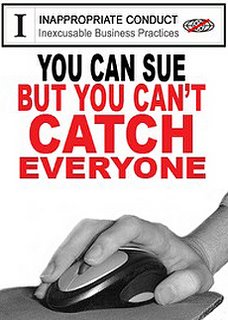
| |
Wednesday, June 28, 2006
P2P insurer will pay your fines if RIAA sues: $19/year!David sez, "Apparently, a company in Sweden is offering file-sharing insurance - they'll pay your fines if you're sued by the RIAA. The /. submitter translates the link as follows: 'For a mere 140 SEK ($19 USD) per year, they will pay all your fines and give you a t-shirt if you get convicted for file sharing.'"
I have no idea if these insurers can be trusted with $19/year, but it actually sounds like a pretty plausible business model. If you count up all the file-sharers on the net, and divide it by the all the fines and settlements ever paid to the RIAA, my guess is that it's way less than $19/year, which suggests that you could make a buck (or Kronor) at this. Link (Thanks, David!)
Update: Travis sez, "This article estimates the odds of being sued by the RIAA at 1:1840. This works out to a break-even point of $34960 per lawsuit."
RIAA’s Grand Total: 10,037 - What are Your Odds?
May 2, 2005
Thomas Mennecke
| The RIAA (Recording Industry Association of America) began their lawsuit campaign against alleged music pirates in June of 2003. When the first RIAA lawsuits began rolling off the assembly line, an enormous media frenzy accompanied this event. Since that time the lawsuits have become second-rate news, as the chances of becoming another RIAA statistic is relatively low – very low. |
With this number in mind, there have been 10,037 people sued by the RIAA since June of 2003. According to the web log “ RIAA Watch”, 6,523 people were sued by the RIAA in 2004. What exactly does this mean?
If we divide the total population of the P2P community (~12 million individuals), by the total number of lawsuits in 2004 (6,523), we get 1,840. In other words, your chances of being sued are 1 in 1,840 for all users (regardless of network) per year. How does that stack against all other odds of dying from an intentional or non-intentional injury? According to the National Safety Council, one’s yearly chances of dying from all external causes were 1 in 1,755 in 2002.
Basically, your chances of dying from all causes of external injuries, whether from a car accident, motorcycle accident, plane crash, murder, etc was 1 in 1,755 – fairly remote odds. Although the odds were remote, they still were not as remote as specific causes of death – such as lightening strikes, suicide, “fall on and from stairs and steps” or being electrocuted. In some cases, your chances of dying from contact with a sharp object were 1 in 2.8 million.
So let us examine the chances of being sued by the RIAA a bit further. The main focus of the RIAA lawsuits have been against the FastTrack network. The effects of this campaign has crippled FastTrack, dropping its population from ~4.5 million to ~2.5 million users. From the last capture of the proportion of networks under the RIAA’s gun in November of 2003, 150 users of FastTrack were sued, compared to 5 Blubster users. Since the RIAA cannot subpoena individuals anymore, we unfortunately cannot provide a more current proportion. However, common knowledge dictates that FastTrack remains a priority, and on November 13 of 2003 it represented ~96% of those being sued.
If we were to eliminate 96% (proportion of FastTrack users) of the 6,523 sued in 2004, the odds of being sued changes dramatically. If we consider only those using a non-FastTrack P2P network, the total number of lawsuits drops to only ~261. In other words, you then have a 1 in 45,977 chance of being sued if you do not use FastTrack. Comparatively, according to the National Safety Council, you have a better chance of being killed in a transportation or non-transportational accident, death from suicide, death from assault or death by legal intervention (such as execution or being shot by a police officer.)
However this assumes the RIAA has remained consistent in which network users are being sued from. Let's say the RIAA was more diverse in which networks they pursue. If we assume half of those sued in 2004 were using FastTrack, that leaves us with 3,261 non-FastTrack related lawsuits. You would then have a 1 in 3,679 chance of being sued. That still places you above all external cases of mortality (1 in 1,755), but below all transportational accidents (1 in 5,953.) However, you would still have a better chance of being killed in an unintentional accident (1 in 2,698), then being sued by the RIAA.
Although these numbers are hardly an exact science, they do reflect the odds of being sued are little different than the risks one takes by simply living day-to-day life. But if we were to get real specific, the odds of being sued by the RIAA for non-FastTrack users (1 in 3,679) is still much greater than death by contact with a venomous snake or lizard (1 in 95 million.) So just watch yourself.